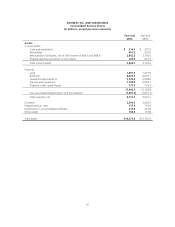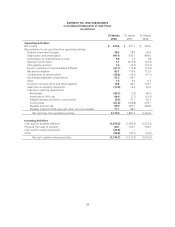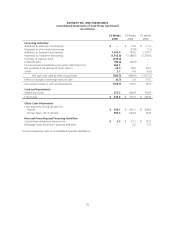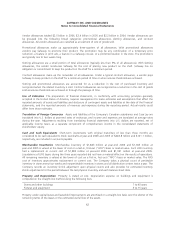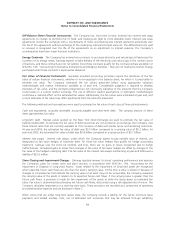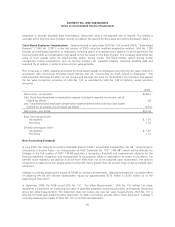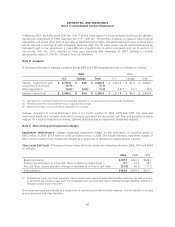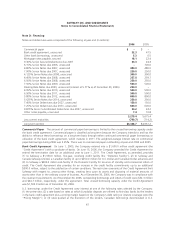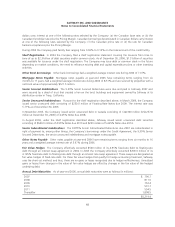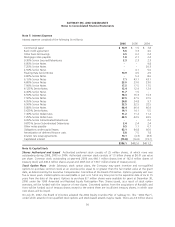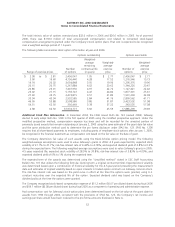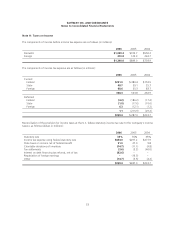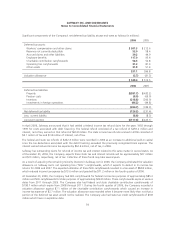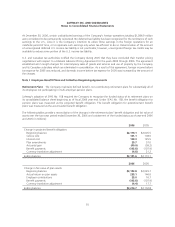Safeway 2006 Annual Report Download - page 63
Download and view the complete annual report
Please find page 63 of the 2006 Safeway annual report below. You can navigate through the pages in the report by either clicking on the pages listed below, or by using the keyword search tool below to find specific information within the annual report.
SAFEWAY INC. AND SUBSIDIARIES
Notes to Consolidated Financial Statements
properties or through favorable lease terminations, discounted using a risk-adjusted rate of interest. This liability is
recorded at the time the store is closed. Activity included in the reserve for store lease exit costs is disclosed in Note C.
Stock-Based Employee Compensation Safeway elected to early adopt SFAS No. 123 (revised 2004), “Share-Based
Payment” (“SFAS No. 123R”), in the first quarter of 2005 using the modified prospective method. SFAS No. 123R
requires all share-based payments to employees, including grants of employee stock options, to be recognized in the
financial statements as compensation cost based on the fair value on the date of grant. The Company determines fair
value of such awards using the Black-Scholes option pricing model. The Black-Scholes option pricing model
incorporates certain assumptions, such as risk-free interest rate, expected volatility, expected dividend yield and
expected life of options, in order to arrive at a fair value estimate.
Prior to January 2, 2005, Safeway accounted for stock-based awards to employees using the intrinsic value method in
accordance with Accounting Principles Board Opinion No. 25, “Accounting for Stock Issued to Employees.” The
following table illustrates the effect on net income and earnings per share for fiscal 2004 if the Company had applied
the fair value recognition provisions of SFAS No. 123, as amended by SFAS No. 148 (in millions, except per-share
amounts):
2004
Net income – as reported $560.2
Add: Stock-based employee compensation expense included in reported net income, net of
related tax effects 2.8
Less: Total stock-based employee compensation expense determined under fair value based
method for all awards, net of related tax effects (47.6)
Net income – pro forma $515.4
Basic earnings per share:
As reported $ 1.26
Pro forma 1.16
Diluted earnings per share:
As reported $ 1.25
Pro forma 1.15
New Accounting Standards
In June 2006, the Financial Accounting Standards Board (“FASB”) issued FASB Interpretation No. 48, “Accounting for
Uncertainty in Income Taxes – an interpretation of FASB Statement No. 109” (“FIN 48”) which will be effective for
Safeway in the first quarter of 2007. FIN 48 prescribes a recognition threshold and measurement attribute for the
financial statement recognition and measurement of tax positions taken or expected to be taken in tax returns. For
benefits to be realized a tax position must be more likely than not to be sustained upon examination. The amount
recognized is measured as the largest amount of benefit that is greater than 50 percent likely of being realized upon
settlement.
Safeway is currently assessing the impact of FIN 48 on its financial statements. Safeway estimates the cumulative effect
of adopting FIN 48 will increase stockholders’ equity by approximately $120 million to $150 million as of the
beginning of fiscal 2007.
In September 2006, the FASB issued SFAS No. 157, “Fair Value Measurement.” SFAS No. 157 defines fair value,
establishes a framework for measuring fair value in generally accepted accounting principles, and expands disclosures
about fair value measurements. This Statement does not require any new fair value measurements. SFAS No. 157 is
effective for fiscal years beginning after November 15, 2007 and interim periods within those fiscal years. Safeway is
currently assessing the impact of SFAS No. 157 on its financial statements.
45



